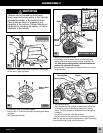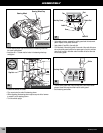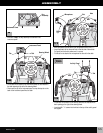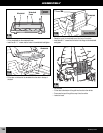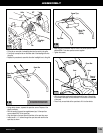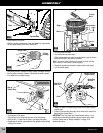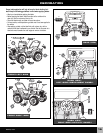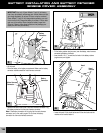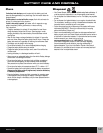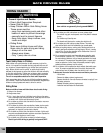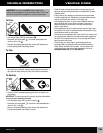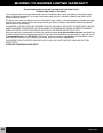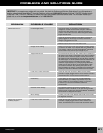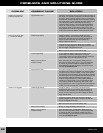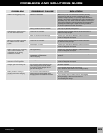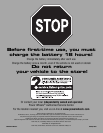
17
BATTERY CARE AND DISPOSAL
M3864pr-0920
If a battery leak develops, avoid contact with the leaking acid and
place the damaged battery in a plastic bag. See information below for
proper disposal.
If acid comes in contact with skin or eyes, flush with cool water for
at least 15 minutes and call a physician.
If acid is internally ingested, give water, milk of magnesia or egg
whites immediately. Never give emetics or induce vomiting.
Call a physician.
• Charge a new battery for at least 18 hours before first use. Never
charge the battery longer than 30 hours. Overcharging or under-
charging the battery may shorten battery life and decrease vehicle
running time.
• After the first charge, recharge the battery for at least 14 hours after
each use. Never charge the battery longer than 30 hours. Charge the
battery after each use, regardless of how long the vehicle was used.
• The battery must be upright while charging.
• Do not allow the battery to run down completely before charging.
• Charge the battery before storing the vehicle.
• Charge the battery at least once per month, even if the vehicle has
not been used.
• Leaving the battery in a discharged condition will ruin it.
• Always remove an exhausted battery from the vehicle. Battery leakage
and corrosion can damage the vehicle.
• Do not store the battery on a surface (such as kitchen countertops)
which could be damaged by the acid contained inside the battery.
Take precautions to protect the surface on which you store the battery.
• Do not store the battery in temperatures above 75° F or below -10° F.
• Prevent the battery from moving freely inside the battery compartment.
Always use the battery retainer (engine cover) to secure the battery
in the battery compartment.
• Examine the battery, charger and their connectors for excessive wear
or damage each time you charge the battery. If damage is detected,
do not use the charger or the battery until you have replaced the worn
or damaged part.
Care
Disposal
• Your Power Wheels
®
battery is a non-spillable sealed lead-acid battery. It
must be recycled or disposed of in an environmentally sound manner.
• Do not dispose of a lead-acid battery in a fire. The battery may explode
or leak.
• Do not dispose of a lead-acid battery in your regular, household trash.
The incineration, landfilling or mixing of sealed lead-acid batteries with
household trash is prohibited by law in most areas.
• Protect the environment by not disposing of this product with house-
hold waste (2002/96/EC). Check your local authority for recycling
advice and facilities (Europe only).
• Return an exhausted battery to a federal or state approved lead-acid
battery recycler, such as a Power Wheels
®
authorized service center or
a local seller of automotive batteries. For the authorized service center
location nearest to you, please visit us on-line at
www.powerwheels.com or call 1-800-348-0751. Contact your
local waste management officials for other information regarding
the environmentally sound collection, recycling and disposal of
lead-acid batteries. If you live in the State of Florida or the State of
Minnesota, it is prohibited by law for anyone to throw away lead-acid
batteries in the municipal waste stream.



